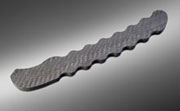Eden Encourages Commercial Application of Carbon Nanotubes & Nanofibers in Automotives & Electronics
Eden Energy Ltd has announced the wide applications of carbon nanotubes and nanofibers in various industries like electronics, automotives where they are mixed with rubber and plastics and used in manufacturing of vehicle tyres etc. Initially they encourage nano tubes and fibers utilisation in batteries followed by plastic and rubber industries where they improve the tensile strength and shelf life of rubber. Eden has also developed new pyrolysis technology along with university of Queensland which produces carbon nanotubes and nanofibers from natural gas and significant advantage of not producing carbon dioxide as an unwanted by-product. First Sale of Eden's Nano-Carbon Fibers to a Battery Manufacturer for Commercial Application: Eden Energy Ltd ("Eden") has made its first commercial sale of its carbon nanotubes (CNT) and carbon nanofibers (CNF) to an industrial battery manufacturer. The sale followed the testing by the battery manufacturer of the suitability of
